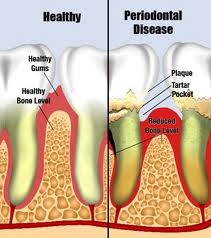Gum disease is an infection that affects the tissues surrounding and supporting teeth. To help prevent gum disease, it’s important to practice good oral hygiene habits every day. This includes brushing at least twice a day with a soft-bristled toothbrush and fluoride toothpaste, flossing daily, using mouthwash to rinse away bacteria, avoiding tobacco products, eating a balanced diet and visiting your dentist regularly for checkups and cleanings.
Additionally, you can use antiseptic rinses or gels to reduce plaque buildup on your teeth between brushings. If you already have gum disease, follow your dentist’s instructions carefully for proper treatment.
Gum disease can be very damaging to your oral health if left untreated. Fortunately, there are several things you can do to help prevent or manage gum disease. Self-care is an important part of managing gum disease and includes brushing twice a day with a soft bristle toothbrush and flossing regularly; using antibacterial mouthwash; eating healthy foods; avoiding smoking and chewing tobacco products; and scheduling regular dental checkups.
With the right self-care routine, you can keep your gums healthy and reduce the risk of developing symptoms associated with gum disease.
Can You Heal Gum Disease Naturally?
Yes, it is possible to heal gum disease naturally. A holistic approach to healing gum disease involves a few different natural methods which are easy and cost effective. The first step in the process of healing gum disease is to practice good oral hygiene by brushing your teeth twice daily with a soft-bristled toothbrush and flossing once a day.
This helps remove plaque from between the teeth and gums, preventing further buildup of bacteria that can cause infection. Additionally, eating nutritious foods such as fruits and vegetables can also help keep your gums healthy by providing them with essential nutrients they need for proper functioning. It’s also important to reduce sugar intake as this has been linked to an increased risk of developing cavities or other dental problems.
Finally, gargling with warm salt water several times per day can reduce inflammation in the mouth while helping remove any bacteria that may be present on your teeth or gums. By following these simple steps you should see improvements within a few weeks if not sooner!
How Do I Get Rid of Gum Disease Asap?
If you’re looking for ways to get rid of gum disease as soon as possible, there are a few steps you can take. First and foremost, it is important to practice good oral hygiene by brushing your teeth at least twice a day with fluoride toothpaste and flossing daily. Using an electric toothbrush or water flosser can also help remove plaque from hard-to-reach areas in the mouth.
You should also visit your dentist regularly, so they can check for signs of gum disease and treat any issues that may arise quickly before it gets worse. Additionally, reducing sugar intake, avoiding smoking or chewing tobacco products and drinking plenty of water throughout the day will all aid in preventing further deterioration of your gums. Finally, if necessary, your dentist may recommend treatments such as scaling and root planing (deep cleaning), antibiotics or even surgery if the case is severe enough.
What is the Fastest Way to Heal a Gum Infection?
The fastest way to heal a gum infection is to practice good oral hygiene immediately. Brushing twice daily with an antibacterial toothpaste and flossing regularly are essential components of good oral hygiene. Additionally, it can be beneficial to rinse your mouth with a saltwater solution several times per day as this helps reduce bacteria in the mouth and kill any germs that may be causing the infection.
If the infection persists, you should see your dentist for further evaluation. Your dentist may prescribe antibiotics or recommend other treatments such as root canal therapy, laser treatment, or even surgery depending on how severe your gum infection is. Taking care of your teeth and gums by brushing correctly, flossing daily and visiting your dentist every six months will also help prevent future infections from occurring.
How Do You Treat Gum Disease Without Going to the Dentist?
Gum disease, also known as periodontal disease, is a common condition caused by the buildup of plaque and bacteria on your teeth. If left untreated, gum disease can lead to tooth loss and other serious health issues. Fortunately, there are ways to treat gum disease without having to go to the dentist.
One way is through proper oral hygiene practices such as brushing twice daily with fluoride toothpaste, flossing at least once a day and using an antiseptic mouthwash regularly. Additionally, eating a balanced diet that includes plenty of fruits and vegetables can help prevent gum disease since these foods contain essential vitamins and minerals needed for healthy gums. Finally, quitting smoking or reducing alcohol consumption may also be beneficial in treating gum disease since they are both factors known to increase inflammation in the body which can worsen existing dental conditions.
While visiting your dentist regularly is important for long-term oral health care maintenance it is possible to treat some cases of mild gum diseases from home without professional help if done correctly.

Credit: www.orangeparkdental.com
How to Reverse Periodontal Disease Naturally
Periodontal disease is an inflammatory condition affecting the gums and teeth that can have serious consequences for oral health if left untreated. Fortunately, there are a number of natural remedies available to help reverse periodontal disease without the need for expensive medical treatments. These include oil pulling, mouthwashes made from natural ingredients such as ginger and turmeric, regular tooth brushing with a soft-bristled brush and flossing daily to remove plaque buildup.
Additionally, making dietary changes like eliminating sugary foods and drinks can help reduce inflammation in the gums and improve overall oral health.
How to Get Rid of Gum Infection Without Antibiotics
Gum infections can often be treated without the use of antibiotics. Brushing and flossing regularly, using an anti-gingivitis mouthwash to help reduce inflammation and swelling, and eating a healthy diet rich in antioxidants are all effective ways to fight gum disease naturally. Additionally, rinsing your mouth with plain warm water after meals or snacks can help flush out any food particles stuck between teeth that could lead to infection.
If the gum infection persists despite these measures, it may be necessary to visit your dentist for more intensive treatments such as scaling or root planing.
Antibiotics for Periodontal Disease Treatment
Periodontal disease is a serious bacterial infection that affects the gums and bones of your mouth. Treatment for periodontal disease typically includes antibiotics to help control the spread of bacteria and to reduce inflammation in the affected areas. Antibiotics used for periodontal disease treatment vary, depending on the type of bacteria present, but commonly prescribed medications include metronidazole, doxycycline, amoxicillin, clindamycin, or minocycline.
How to Cure Gingivitis in a Week at Home
Gingivitis is an inflammation of the gums that can cause redness, swelling and bleeding. Although it is not a serious health condition, left untreated it can lead to more serious gum diseases like periodontitis. Fortunately, there are several things you can do at home to help cure gingivitis in just one week.
Start by brushing your teeth twice a day with fluoride toothpaste and flossing once a day to remove plaque buildup from between your teeth. Additionally, try using an antiseptic mouthwash after each brushing session as this will help reduce bacteria in your mouth and reduce inflammation of the gums. Finally, make sure you’re eating a balanced diet including plenty of fruits and vegetables which will provide essential vitamins and minerals for good oral hygiene.
With these simple steps followed regularly over the course of one week you should be able to see significant improvement in your gingivitis symptoms!
What is the Fastest Way to Get Rid of a Gum Infection
The fastest way to get rid of a gum infection is by following your dentist’s instructions for proper oral hygiene, which will help reduce the inflammation and bacteria that cause gum infections. This includes brushing twice daily with a soft-bristled brush, flossing at least once per day, using an antiseptic mouthwash regularly, and having regular dental cleanings. Additionally, certain medications may be prescribed to help treat any underlying conditions contributing to the infection.
I Cured My Periodontal Disease
I recently experienced a breakthrough in my battle against periodontal disease. After months of diligent oral hygiene and following the advice of my dentist, I am now free from any symptoms or signs of this serious condition. It was a long road to recovery, but ultimately I was able to cure it without any invasive procedures or surgery.
My success story is proof that with commitment and dedication, you can conquer Periodontal Disease!
Gingivitis Treatment Antibiotics
Gingivitis is a common form of gum disease that can be effectively treated with antibiotics. Antibiotics work by killing off the bacteria that cause gingivitis, thus helping to reduce inflammation and prevent further damage to your gum tissue. In addition to antibiotics, it’s important to maintain good oral hygiene practices such as brushing and flossing regularly in order to help keep gingivitis at bay.
Home Remedies for Gum Infection
Gum infections can be painful and uncomfortable, but fortunately there are a few home remedies that may help to reduce symptoms. For instance, warm salt water rinses can help to flush out bacteria from the infected area, while diluted hydrogen peroxide can be used as an antibacterial mouthwash. Additionally, natural oils such as tea tree oil or clove oil have anti-inflammatory properties which may soothe gum pain and promote healing.
Finally, eating plenty of crunchy fruits and vegetables like apples or celery has been shown to remove plaque buildup in the gums.
Conclusion
Gum disease is a serious and potentially life-threatening condition that requires proper oral hygiene and regular dental visits to stay on top of. While self-care measures such as brushing twice daily, flossing regularly, using an antiseptic mouthwash, eating nutritious foods, avoiding tobacco products, and scheduling regular checkups with your dentist can help prevent gum disease from developing or worsening in the first place; if you do experience any signs or symptoms of gum disease such as bleeding gums or bad breath it’s important to speak with your dentist right away. By following these simple tips for gum disease self-care you can ensure that your teeth and gums remain healthy for years to come!






